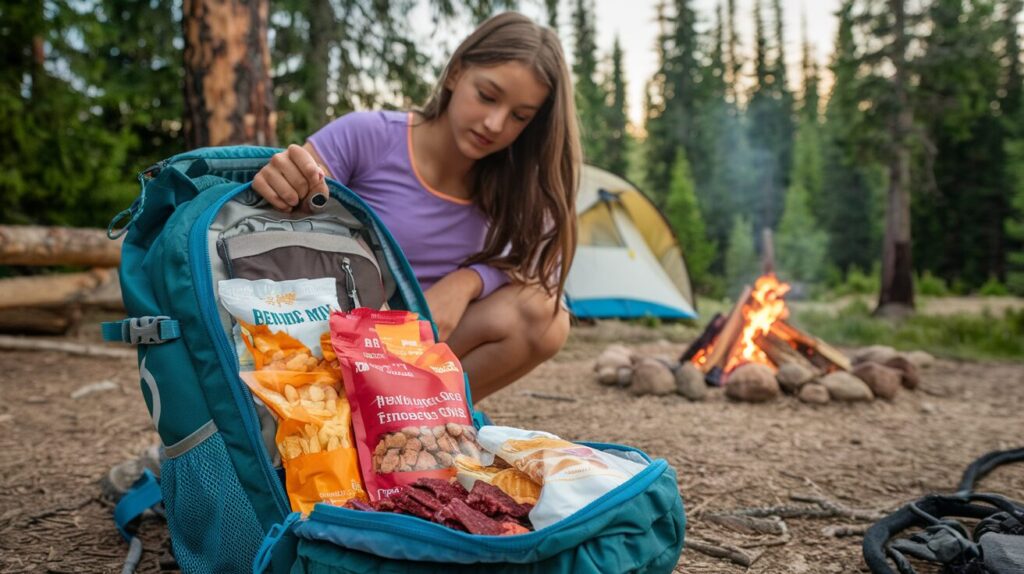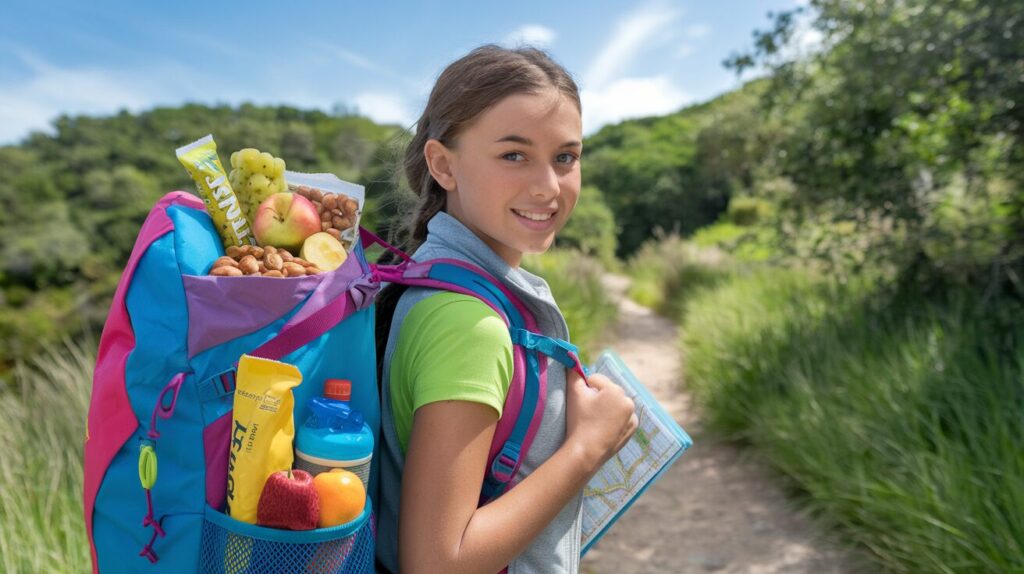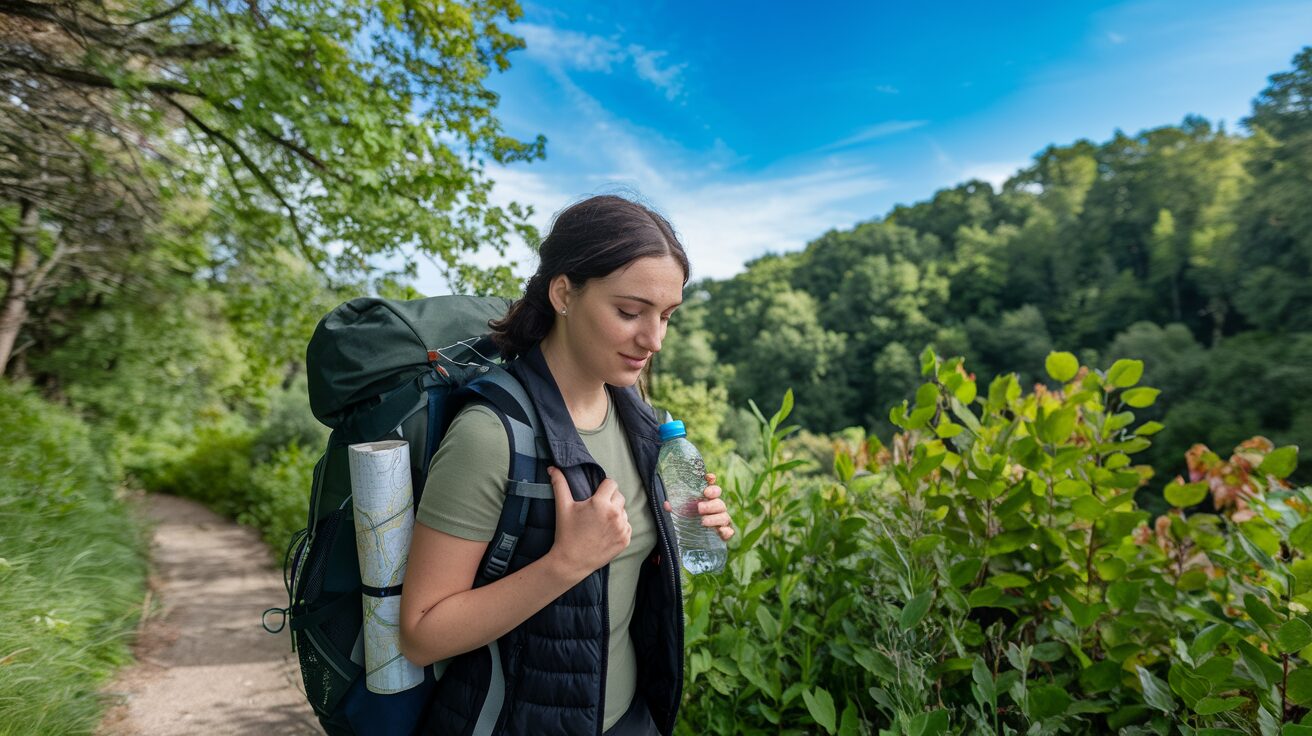Maintaining good nutrition on the trail is key to staying energized and safe. This Hiking Backpacking Nutrition Guide will cover essential tips for fueling up, hydration, and recovery to enhance your hiking experience and health.
Embarking on a hiking or backpacking adventure requires more than just the right gear fueling your body properly to stay energized and maintain peak performance on the trail is crucial.
This Hiking Backpacking Nutrition Guide is designed to provide essential tips for choosing the right foods, staying hydrated, and optimizing recovery after a long day of hiking.
From packing calorie-dense snacks to knowing how much water to bring, these strategies will help you stay strong and healthy, whether you’re on a day hike or a multi-day trek.
Understanding hiking nutrition isn’t just about having enough fuel; it’s about being prepared for the unexpected. Weather conditions, trail challenges, and extended hikes can demand more from your body than anticipated. This guide will ensure you can handle any surprises while feeling your best.
If you’re new to hiking, you may also want to familiarize yourself with some common trail terminology. Check out our Hiking Terms for Beginners Phrases and Words Every Hiker Should Know to brush up on key vocabulary and maximize your outdoor experience.
Top 10 Hiking Nutrition Tips for Staying Healthy on Trail

1. Drink Before You’re Thirsty
Staying hydrated is crucial to prevent fatigue and maintain peak performance. It’s recommended to drink 1/2 liter of water per hour of hiking.
Why Hydration is Important
- Enhances stamina
- Reduces risk of cramps
- Boosts mental clarity
2. Take More Food Than You Think You Need
Hiking is unpredictable. Pack a little extra in case the trail is longer than expected or you feel hungrier than usual.
Types of Foods to Pack
- High-calorie snacks (e.g., energy bars, nuts)
- Lightweight and non-perishable items
3. opt for Low-Volume, Calorie-Dense Foods
Choosing calorie-dense foods saves space and ensures you carry less weight.
Examples of Calorie-Dense Foods
- Freeze-dried meals
- Granola, protein bars
- Tuna packets, beef jerky
4. Don’t Forget Your Protein
Protein aids recovery and maintains muscle mass, especially on longer hikes.
Protein Sources for the Trail
- Protein bars, jerky
- Whey protein supplements
- Nuts and seeds
5. Choose Foods That Won’t React Negatively With You
Stick to foods that you digest easily to avoid discomfort while hiking.
Tips for Food Choices
- Avoid known allergens or irritants
- Pack foods that agree with your body
6. Supplement if Needed
If it’s challenging to carry enough nutrients, consider supplements like electrolytes or protein powders.
Benefits of Supplements on the Trail
- Light and easy to carry
- Helps maintain energy and recovery
7. Fuel with Carbs
Carbohydrates are an essential source of quick energy for hiking. Eat carb-rich foods before and during the hike for optimal performance.
Best Carbs for Hiking
- Oatmeal, trail mix
- Whole-grain wraps, pasta
8. Eat Breakfast Before Hiking
Starting your hike on an empty stomach can reduce energy levels. Have a balanced breakfast to fuel your body.
Ideal Hiking Breakfast Options
- Oatmeal with nuts and berries
- Breakfast sandwiches
- Protein shakes
9. Eat Small Snacks Every Hour
Frequent small snacks help maintain energy levels and prevent sudden fatigue.
Suggested Snacks
- Trail mix, nuts
- Fresh or dried fruit
- Nut butter packets
10. Prioritize Recovery Nutrition Post-Hike
After a hike, eating a balanced meal with protein, carbs, and fats can aid muscle recovery and replenish energy.
Recovery Meal Ideas
- Protein-packed sandwiches
- Freeze-dried meals with vegetables
- Hydration with electrolyte-enriched water
Additional Tips for Hiking Nutrition
- What Not to Eat Before Hiking
Avoid heavy, greasy foods before hiking as they can cause sluggishness. - How Much Water to Drink
Plan for 1/2 liter per hour of hiking and adjust based on temperature and exertion. - Should You Carb Load?
A light carb load before long hikes may help maintain stamina.
Health Benefits of Hiking with Proper Nutrition
- Improves endurance and stamina
- Reduces muscle fatigue
- Helps maintain mental focus
What type of food is best for hiking?

- Calorie-Dense Foods: Foods high in calories, like trail mix, nuts, and dried fruits, provide sustained energy without taking up much space in your pack.
- Low-Volume, Lightweight Options: Pack items like dehydrated or freeze-dried meals, which are easy to carry and quick to prepare.
- Complex Carbohydrates: Opt for complex carbs like whole grains, which release energy slowly and help maintain endurance over long hikes.
- Protein-Rich Foods: Protein bars, jerky, and hard cheeses offer muscle support and help with recovery after the hike.
- Healthy Fats: Foods like nut butter, seeds, and avocados provide long-lasting energy to keep you full longer.
How much food to eat when hiking?
- Caloric Needs Depend on Intensity and Duration: Generally, hikers should consume 2,500 to 4,500 calories per day for long treks, though shorter hikes may require less.
- Snacks Every 1-2 Hours: Eating small snacks every hour or two helps maintain energy and prevents fatigue.
- Hydrate Alongside Eating: Drinking water with snacks aids digestion and keeps your energy levels stable.
What not to eat before hiking?
- Heavy, Greasy Foods: Avoid fatty or fried foods, which can cause sluggishness and digestive discomfort.
- Excessive Sugars: Sugary foods cause quick energy spikes followed by crashes, which aren’t ideal for sustained endurance.
- Gas-Producing Foods: Foods like beans and broccoli may lead to bloating and discomfort on the trail.
- Spicy Foods: Avoid spicy foods, which can lead to indigestion and an upset stomach.
What food do hikers carry?
It is very important to carry good and sufficient food ultimate boost, also quality and quantity because this is good for your health and must used for a long time because you don’t know actually how much time you hike.

- High-Calorie Snacks: Trail mix, granola bars, dried fruits, nuts, and seeds are popular options.
- Easy-to-Prepare Meals: Pre-packaged dehydrated or freeze-dried meals save weight and are simple to make.
- Electrolyte Supplements: Tablets or powders help replace lost minerals and keep energy up in hot or demanding conditions.
- Energy Bars: Protein and energy bars are compact, lightweight, and provide quick fuel.
- Hydration Options: Water bladders or collapsible bottles, along with powdered hydration mixes, are essential for staying hydrated.
What do hikers eat for energy?
If you are a beginner must follow this important energy during hiking
- Complex Carbohydrates: Foods like oats, whole-grain bread, and pasta provide slow-releasing energy.
- Quick Sugars for Immediate Energy: Small amounts of chocolate or energy gels can provide a quick energy boost.
- Nuts and Seeds: High in fats and calories, nuts and seeds offer long-lasting energy.
- Fruits for Natural Sugars: Fresh fruits like apples and oranges provide quick carbohydrates and hydration.
What is a good hiking snack?
- Trail Mix: A mix of nuts, dried fruits, and sometimes chocolate provides fats, carbs, and a bit of sugar.
- Jerky or Hard Cheeses: Both are protein-rich and easy to carry, making them great for muscle recovery.
- Energy Bars: Choose ones with a mix of carbs, protein, and fats for sustained energy.
- Fruit: Dried or fresh fruit, like apples or bananas, offer natural sugars and fiber for quick energy.
- Nut Butter: Single-serving packets of almond or peanut butter are easy to carry and calorie-dense.
How do you prepare food for hiking?
- Pre-Packaged Meals: Freeze-dried meals are lightweight, easy to prepare with hot water, and don’t require refrigeration.
- Portion Control: Divide snacks and meals into portions to avoid overpacking and to ensure balanced intake.
- Opt for Durable Foods: Foods that don’t spoil easily, like nuts, dried fruits, and jerky, are great choices.
- Use Resealable Bags: Pack foods in resealable bags for easy access and minimal waste.
- Pre-Cook and Pack: If bringing fresh food, pre-cook and store it in reusable containers for easy consumption on the trail.
What are at least 3 health benefits of hiking?
- Improves Cardiovascular Health: Hiking is an aerobic exercise that strengthens the heart and improves blood circulation.
- Builds Muscle and Endurance: It strengthens muscles, particularly in the legs, core, and back, and boosts overall endurance.
- Boosts Mental Health: Time in nature can reduce stress, improve mood, and enhance cognitive function, offering mental relaxation.
Why is protein good for hiking?
- Muscle Repair and Recovery: Protein aids in muscle recovery, which is crucial after strenuous hikes to prevent fatigue and injury.
- Boosts Satiety: Protein-rich foods help keep you full longer, so you won’t feel hungry as quickly.
- Supports Immune Function: Protein is essential for immune health, which helps hikers recover faster and stay healthy on long trips.
FAQs About Hiking Backpacking Nutrition Guide
How Much Should I Eat While Hiking?
Aim for 2,500–4,500 calories per day when backpacking, adjusting based on hike difficulty, length, and personal needs. Day hikes may require fewer calories but still depend on the same factors.
Are bananas good for hiking?
Natural Sugars: Bananas provide quick energy from their natural sugars, which helps with instant energy needs.
High in Potassium: Potassium is essential for muscle function and can prevent cramping, especially on long hikes.
Portable and Convenient: Bananas are easy to carry and don’t require packaging, making them an eco-friendly snack.
Lightweight: Compared to other fresh fruits, bananas are lightweight and provide essential nutrients.
How Often Should I Eat While Hiking?
Eat small snacks or meals every two hours to stay energized, even if you’re not very hungry, to maintain steady energy levels.
Should I Eat More Than Normal When Hiking?
You don’t need to eat more overall but should eat more frequently about every two hours to replenish energy from physical exertion.
How Do I Strengthen My Body for Hiking?
Focus on endurance, cardio, and strengthening leg and core muscles to prepare for hiking challenges.
How Do You Fuel Your Body for Hiking?
Fuel your body with nutritious foods that meet your energy needs and stay hydrated throughout the hike.
How Much Water Should I Drink While Hiking?
Plan to drink about half a liter of water per hour of hiking, so for a 4-hour hike, bring at least 2 liters.
Should I Hike on an Empty Stomach?
No, it’s best to have a nutritious breakfast before hiking and to carry snacks for sustained energy.
Should You Carb Load Before a Hike?
A balanced, carb-rich meal before a hike can be beneficial, but full carb loading isn’t necessary. Focus on nutritious carbs, protein, and vegetables.
Best Hiker’s Diet for a Beginner?
For extended hiking trips, nutritionist and long-distance hiker, Dr. Brenda Braaten, Ph.D, recommends the following caloric breakdown: 45-55% carbs; 35-40% fats; 10-15% protein. Also, check out the best post by thehikinglife.com The Hiker’s Diet
Conclusion Hiking Backpacking Nutrition Guide
Following this Hiking Backpacking Nutrition Guide helps ensure you’re energized and ready for whatever the trail throws your way.
By following these ten tips, you can ensure that you have the energy and nutrients you need to enjoy your hiking and backpacking adventures. Remember, proper nutrition is essential for a safe and enjoyable experience.
If this Blog Post Helps you share with your friends follow us for more hiking Guide and Tips also on social media to get updates Thank you for visiting – myhikingguide.com

